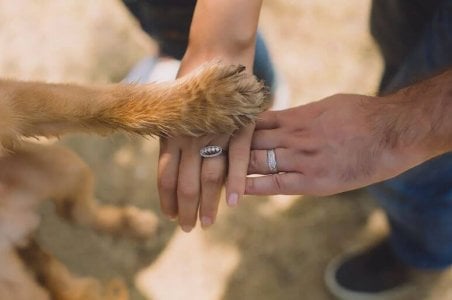This study claims you and your dog are more alike than you think!
- Replies 1
We’ve heard the old adage, ‘like owner, like dog’ – but did you know it has a more scientific basis than you think?
A new study claims that those of us who have a strong bonded relationship with our dogs also have a strong personality match with them.
Some people say that owners can start to look like their dogs, but the similarities apparently don’t end there.
A new study has discovered that dog owners with good relationships with their dogs actually match their pets on levels of warmth, enjoyment of outdoor exercise, and selflessness with possessions. When they are well-matched it is called a ‘functional relationship’.
According to researchers from the Max Planck Institute for the Science of Human History in Germany, strong bonds were fostered when the dog was ‘more open, agreeable, and neurotic than their human’. The researchers reviewed 29 published papers on dog-owner relationships.
The authors wrote: ‘Openness and agreeableness of the dog could represent traits which enable them to facilitate these social interactions especially well.’
This was particularly observed in cases where the owners ‘did not possess these traits’, but ‘benefited greatly from the presence of their dogs’.
According to the study, forming a functional relationship with a dog has both physical and psychological benefits for humans.
However, in the post-COVID world and amid the current cost-of-living crisis, there has been an increase in owners giving up their pets. Financial reasons, behavioural problems, and no longer having the time to look after their pets were among the reasons cited.
Late last year reports that pet shelters were ‘overwhelmed’ by the number of pet owners giving up their companions surfaced. One shelter said they received ten to twenty calls a week from people who wanted to give up their pets, but since the lockdown ended, they received over one hundred calls each week. You can read more details about this story here.
For the new study, researchers wanted to discover what personality traits lead to positive dog-human relationships with the hope that this could lead to potential owners buying or adopting the best dog for them. This, in turn, will prevent or reduce cases of ‘pet regret’.
The research regarded a functional human-dog relationship as ‘complementary’, where both are similarly friendly but are opposite in dominance and submissiveness.
‘Although the combination of a dominant dog and a submissive owner appears to be challenging in practical ownership,’ the researchers said.
A complementary relationship was found to be associated with high attachment, and therefore, a longer, more caring, and more fulfilling relationship.
On the other hand, dysfunctional relationships were marked by behavioural problems in the dogs, such as aggression and separation anxiety. The researchers then analysed existing research to see which personalities were associated with functional and dysfunctional relationships between humans and their dogs.
The results showed that dog personality traits associated with a complementary relationship included energy, affection, intelligence, and responsiveness to training.
Those that are antisocial and more territorial had trouble engaging in training and tended to destroy items. They were also associated with having problematic relationships with humans.
Moreover, neurotic and avoidant attached owners who do not care what others thought of them tended to have more aggressive pooches.
Owners who were highly attached to their pets were prone to having a dog with separation anxiety. This was more often the case with people who are divorced, widowed, or living without children. It was suggested that this was a result of a ‘humanistic orientation towards the dog’.
‘Highly attached owners often owned dogs with separation-related problems might be because the owners themselves are very worried about the imminent spatial separation, which in turn creates a negative feeling in the dogs,’ the researchers explained.
Despite the results, no owner involved in any of the published studies stated that they considered personality or attachment compatibility when getting a dog. It was reported that the ‘look’ of the dog was often an important aspect that pet owners considered when getting a dog.
‘Although cuteness as one aspect of looks is actually related to unsuccessful ownership,’ the researchers said.

Do you have any pets, members? Share your stories of how you got them and what their personality is like in the comments!
A new study claims that those of us who have a strong bonded relationship with our dogs also have a strong personality match with them.
Some people say that owners can start to look like their dogs, but the similarities apparently don’t end there.
A new study has discovered that dog owners with good relationships with their dogs actually match their pets on levels of warmth, enjoyment of outdoor exercise, and selflessness with possessions. When they are well-matched it is called a ‘functional relationship’.
According to researchers from the Max Planck Institute for the Science of Human History in Germany, strong bonds were fostered when the dog was ‘more open, agreeable, and neurotic than their human’. The researchers reviewed 29 published papers on dog-owner relationships.
The authors wrote: ‘Openness and agreeableness of the dog could represent traits which enable them to facilitate these social interactions especially well.’
This was particularly observed in cases where the owners ‘did not possess these traits’, but ‘benefited greatly from the presence of their dogs’.
According to the study, forming a functional relationship with a dog has both physical and psychological benefits for humans.
However, in the post-COVID world and amid the current cost-of-living crisis, there has been an increase in owners giving up their pets. Financial reasons, behavioural problems, and no longer having the time to look after their pets were among the reasons cited.
Late last year reports that pet shelters were ‘overwhelmed’ by the number of pet owners giving up their companions surfaced. One shelter said they received ten to twenty calls a week from people who wanted to give up their pets, but since the lockdown ended, they received over one hundred calls each week. You can read more details about this story here.
For the new study, researchers wanted to discover what personality traits lead to positive dog-human relationships with the hope that this could lead to potential owners buying or adopting the best dog for them. This, in turn, will prevent or reduce cases of ‘pet regret’.
The research regarded a functional human-dog relationship as ‘complementary’, where both are similarly friendly but are opposite in dominance and submissiveness.
‘Although the combination of a dominant dog and a submissive owner appears to be challenging in practical ownership,’ the researchers said.
A complementary relationship was found to be associated with high attachment, and therefore, a longer, more caring, and more fulfilling relationship.
On the other hand, dysfunctional relationships were marked by behavioural problems in the dogs, such as aggression and separation anxiety. The researchers then analysed existing research to see which personalities were associated with functional and dysfunctional relationships between humans and their dogs.
The results showed that dog personality traits associated with a complementary relationship included energy, affection, intelligence, and responsiveness to training.
Those that are antisocial and more territorial had trouble engaging in training and tended to destroy items. They were also associated with having problematic relationships with humans.
Moreover, neurotic and avoidant attached owners who do not care what others thought of them tended to have more aggressive pooches.
Owners who were highly attached to their pets were prone to having a dog with separation anxiety. This was more often the case with people who are divorced, widowed, or living without children. It was suggested that this was a result of a ‘humanistic orientation towards the dog’.
‘Highly attached owners often owned dogs with separation-related problems might be because the owners themselves are very worried about the imminent spatial separation, which in turn creates a negative feeling in the dogs,’ the researchers explained.
Despite the results, no owner involved in any of the published studies stated that they considered personality or attachment compatibility when getting a dog. It was reported that the ‘look’ of the dog was often an important aspect that pet owners considered when getting a dog.
‘Although cuteness as one aspect of looks is actually related to unsuccessful ownership,’ the researchers said.
Key Takeaways
- A study found that dog owners with good relationships with their furry friends tend to have the same personality as them.
- A 'functional relationship' is formed when the dog and owner match on their warmth, enjoyment of outdoor exercise, and selflessness with their possessions.
- The study was conducted in the hope of reducing or preventing the rate of pet relinquishment, and helping owners make informed decisions when buying or adopting a dog.










